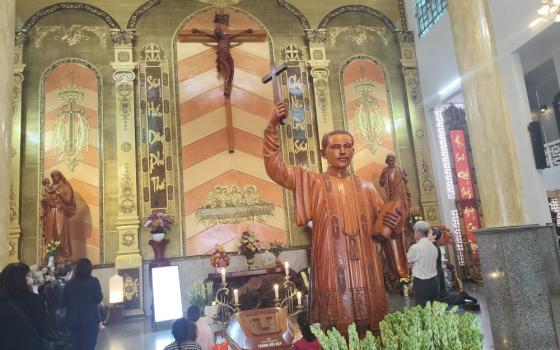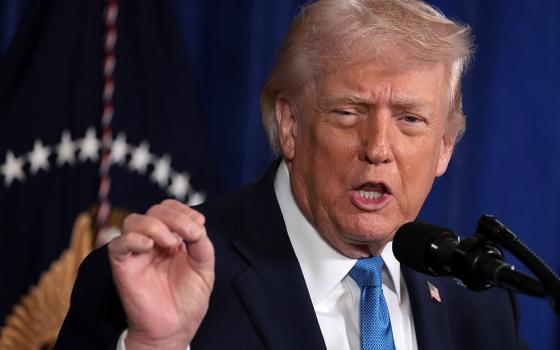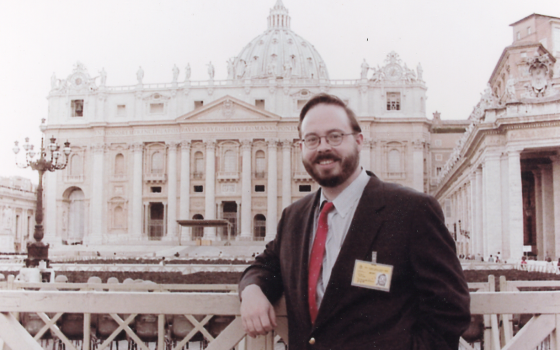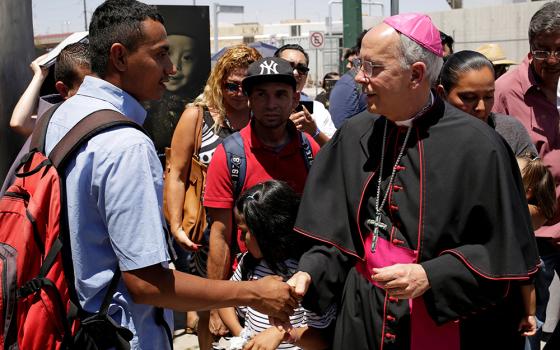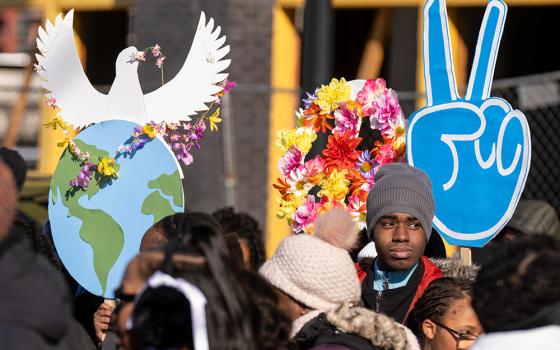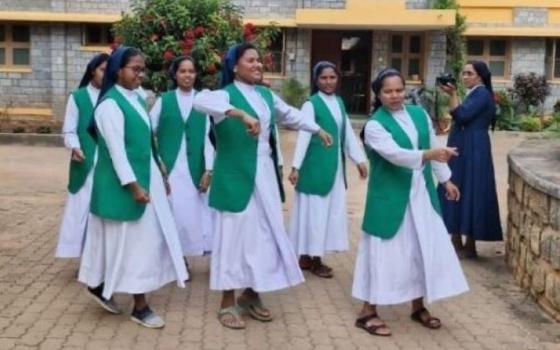Archbishop John Wester of Santa Fe, N.M., (right) takes part in a demonstration in El Paso, Texas, against mass deportation alongside Bishop Peter Baldacchino of Las Cruces, N.M.; Archbishop Gustavo García-Siller of San Antonio and Bishop Mark Seitz of El Paso. Wester on June 26 promulgated a letter by 40 leaders of several faiths, calling the budget bill before Congress a "moral failure" that should be opposed. (OSV News/Bob Roller)
Twenty U.S. Catholic bishops have signed onto an interfaith effort opposing President Trump’s One Big Beautiful Bill Act and the U.S. Conference of Catholic Bishops issued its strongest statement to date on Thursday criticizing the bill.
But the bishops’ conference fell short of outright opposing the multitrillion-dollar tax cut and spending measure, a cornerstone of Trump’s legislative agenda.
Analysts have said proposals in the bill could cut Medicaid funding — health care for the poor — by as much as $880 billion over 10 years. That would mean stripping health coverage from as many as 16 million Americans and lead to about 50,000 preventable deaths each year, according to a report released June 25.
The U.S. Senate is expected to vote on the bill as early as today (June 27) before Congress breaks for the July 4 recess.
Archbishop John Wester of Santa Fe, New Mexico, rallied faith leaders' effort to oppose the legislation. Wester's letter urging senators to reject the bill was signed by more than 40 leaders of several faith traditions.
The opposition from the 20 bishops contrasts sharply with the noncommittal statement from Archbishop Timothy Broglio, president of the U.S. Conference of Catholic Bishops, who fell short of outright opposing Trump’s bill.
The contrast reflected the sharp ideological division in the U.S. bishops conference, many of whom remain warm to the Trump administration’s opposition to abortion and gender-affirming care, while other bishops are repelled by the president’s plan to give large tax cuts to the super-rich while throwing the poor off health care and cut other safety net programs.
Advertisement
More than 60 congregations and organizations of Catholic women religious also oppose the bill.
Wester's letter urged public opposition.
"We, the undersigned faith leaders, write to ask for your opposition to HR 1, the budget reconciliation legislation currently being considered by the U.S. Senate," the letter said. "We believe that the changes made by the U.S. Senate to the legislation are insufficient and do not significantly mitigate its adverse effects."
Meanwhile, Broglio’s letter, quoting Pope Leo XIV, criticized the bill, but did not go as far as Wester’s letter. Instead, Broglio went out of his way to praise elements of the bill.
"As Pope Leo XIV recently stated, it is the responsibility of politicians to promote and protect the common good, including by working to overcome great wealth inequality," Broglio said. "This bill does not answer this call. It takes from the poor to give to the wealthy.”
The Senate is wrapping up its version of the budget legislation that House Republicans passed in May. The Senate plan is to move forward under rules that would allow it to pass with a simple majority and avoid a filibuster.
Wester, who was joined by 19 U.S. bishops in signing the letter, told OSV News they thought it would be "a good idea for faith leaders to come together to express our deep and profound concern about this bill, because it's going to hurt and harm so many people, particularly immigrants and families and those who depend on the government to assist them for their medical needs."
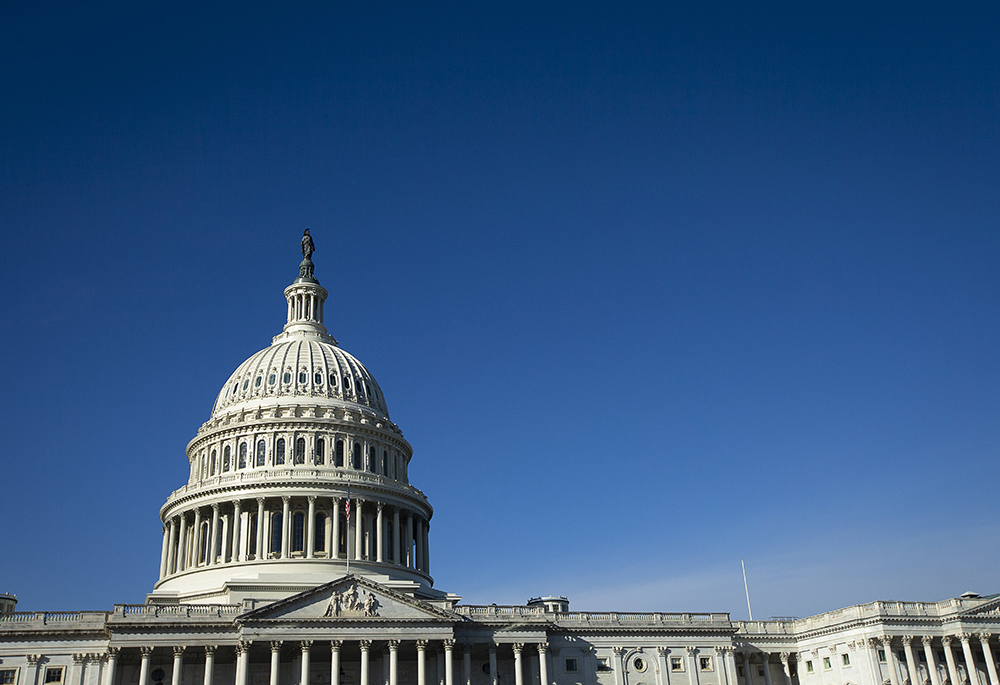
A view of the U.S. Capitol building in Washington. (CNS/Tyler Orsburn)
"This (legislation) is really violating our Catholic social teaching in terms of a preferential option for the poor, welcoming the stranger in our midst, the common good, subsidiarity," he said. "It's a very draconian kind of a bill that seems to have little or no regard for the people that will be affected by it."
The Wester letter objected to allocating millions of dollars to the government's mass deportation campaign, expressing concern that campaign would also infringe upon their houses of worship.
"We have already witnessed a reduction in attendance at many of our religious services in our denominations, as the threat of enforcement has deterred many families from practicing their faith," the letter said.
It also objected to "severe cuts in healthcare coverage and food assistance to millions of both low-income citizens and legal residents, including asylum-seekers and refugees." It argued those cuts would drive them "deeper into poverty."
"From our various faith perspectives, the moral test of a nation is how it treats those most in need of support. In our view, this legislation will harm the poor and vulnerable in our nation, to the detriment of the common good," the letter said. "Its passage would be a moral failure for American society as a whole."
Bishops leading dioceses who joined Wester in signing the letter were Cardinal Robert McElroy of Washington; Cardinal Joseph Tobin of Newark, New Jersey; Bishop Steven Biegler of Cheyenne, Wyoming; Bishop John Dolan of Phoenix; Archbishop Paul Etienne of Seattle; Bishop Joseph Kopacz of Jackson, Mississippi; Bishop Michael Pham of San Diego; Archbishop Mitchell Rozanski of St. Louis; Bishop Jaime Soto of Sacramento, California; Bishop John Stowe of Lexington, Kentucky; Bishop Joseph Tyson of Yakima, Washington; and Archbishop Edward Weisenberger of Detroit. Retired Bishop Nicholas DiMarzio of Brooklyn, New York, several other auxiliary bishops, and representatives of the Sisters of Mercy of the Americas rounded out the Catholic signatories on that letter, which also included representatives from Protestant, Jewish and Islamic faith traditions.
The diversity of signatories, Wester told OSV News, "are very reflective of the deep-felt concern among so many people across the country for the immigrants and for our fellow citizens who will suffer because of this bill."
Archbishop Timothy P. Broglio of the U.S. Archdiocese for the Military Services, president of the U.S. Conference of Catholic Bishops, and U.S. President Donald Trump, are pictured in a combination photo. The USCCB in a June 26, 2025, letter to the Senate reiterated its support for and opposition to various provisions in Trump’s budget bill, the One Big Beautiful Bill Act, passed by the House and under consideration in the Senate. (OSV News photo/Bob Roller/Evelyn Hockstein, Reuters)
In the Broglio letter issued the same day through the U.S. Conference of Catholic Bishops, the conference commended senators for "provisions that promote the dignity of human life and support parental choice in education" in that legislation. But it also made clear "drastic changes" to the legislation are needed to prevent "provisions that will harm the poor and vulnerable."
In a statement, Broglio of the U.S. Archdiocese for the Military Services, president of the USCCB, said, "Congress must be consistent in protecting human life and dignity."
Citing the letter the conference sent to senators, Broglio said he urged them to "think and act with courage and creativity to protect human dignity for all, to uphold the common good, and to change provisions that undermine these fundamental values."
The letter from the bishops' conference said that it supports provisions that would strip some taxpayer funds from Planned Parenthood, one promoting school choice, and another they said would incentivize charitable giving and development.
However, they objected to Medicaid and SNAP cuts, cuts to environmental efforts, and to an increase in funds for "punitive" immigration policies.
"We urge you to remain consistent in protecting human life and dignity by pursuing a better way forward that protects rather than harms poor and vulnerable people," the letter said. "Before advancing this bill, we ask you to think and act with courage and creativity to preserve human dignity and uphold the common good and to change the provisions that undermine these fundamental values."

